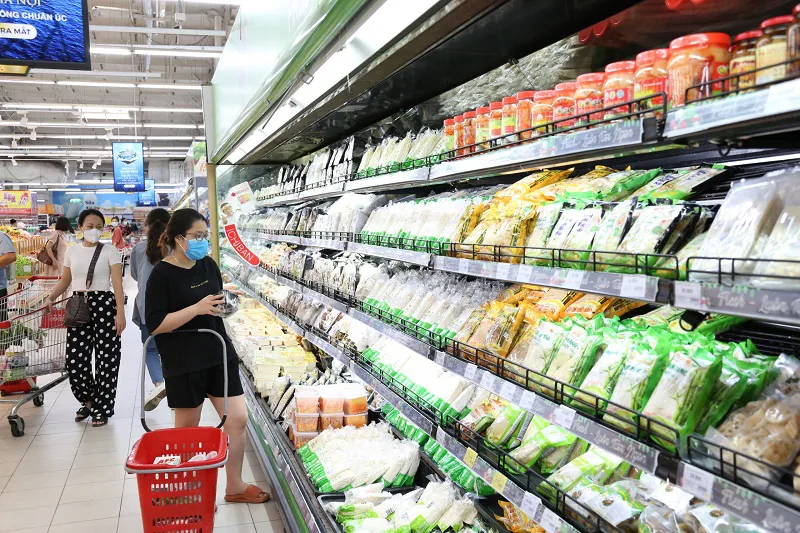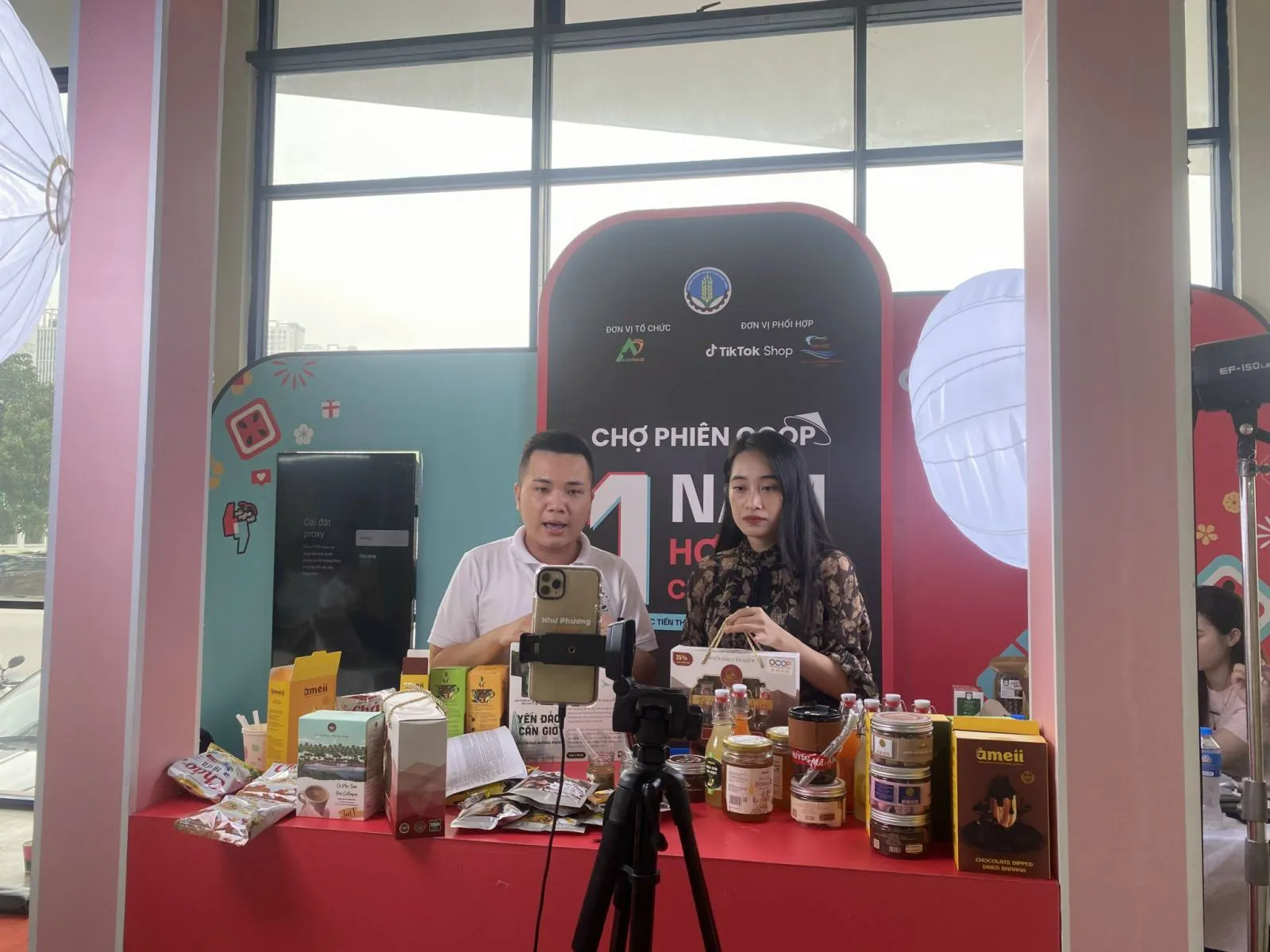Authorities and businesses team up to boost Vietnamese e-commerce
Hanoi will open a VND10 billion (nearly US$400,000) live streaming center this July to help businesses sell their products online.
Vietnamese products, especially those under the One Commune, One Product (OCOP) program, have become increasingly popular with consumers in Hanoi's supermarkets and shopping malls. However, ensuring the continued success of these products, especially in the context of a booming e-commerce landscape, is a pressing concern for both authorities and businesses.
Domestic products beat imports
| Local consumers shop at Big C Thang Long supermarket. Photo: Thanh Hai |
A recent survey conducted by several supermarkets shows that Vietnamese products are being displayed in an increasing variety and are beating imported goods.
The survey conducted by the Co.opmart supermarket chain showed that Vietnamese products hold a dominant position, accounting for more than 95% of all food products.
At the GO!/Big C supermarket chain, Vietnamese products account for more than 90% of the approximately 45,000 SKUs (stock keeping units).
Similarly, at the WinMart/WinMart+ supermarket chain, Vietnamese products consistently account for 80-90% of the total assortment, with agricultural products accounting for over 30% of total sales.
After five years of the OCOP program, Vietnam has a total of 13,000 specialty products nationwide, according to the Ministry of Agriculture and Rural Development (MARD). The monthly production of these products has been steadily increasing, while the product composition has also shifted - more than 70% are now three-star products, about 26% are four-star products, and the rest are five-star products.
The OCOP program has brought about remarkable changes in trade and commerce. Dedicated online sales channels on TikTok have now been established exclusively for OCOP products, enabling widespread distribution and bridging the gap between producers and consumers, the ministry said.
As the locality with the highest number of OCOP products, Hanoi has evaluated, categorized and certified over 2,700 OCOP products. This includes six premium five-star products, 12 potential five-star ones, over 1,400 four-star products, and 1,220 three-star products, positioning the city as a national leader in the OCOP program's development.
In addition to evaluating and classifying products, various authorities have made extensive efforts to promote and market OCOP products. However, the challenge of ensuring sustainable market access remains a pressing concern, according to local insiders.
Nguyen Nhu Hao, Director of Que Duong Safe Grapefruit Cooperative (Hoai Duc District, Hanoi), said that consumer demand for clean and organic grapefruit is steadily increasing.
As a result, cooperative members are hoping for more guidance from the authorities on clean grapefruit growing techniques to expand their acreage to meet consumer demand. They are also looking to link up with supermarket distribution channels to establish stable product outlets, he added.
"In terms of product consumption, the cooperative has previously contacted inner-city supermarket systems to have our products on their shelves, but the sales pace has been quite slow. As for online sales, we have not been able to implement it yet," he said.
Hao said Que Duong grapefruit is the district's OCOP product.
In response to the Que Duong Safe Grapefruit Cooperative's request, Hoang Thi Huyen, representative of the e-commerce platform Buudien.vn, said that the platform will soon launch the sale of grapefruit and custard apple as a pilot project to help farmers access e-commerce channels and sell their agricultural products.
Launched in March, the Buudien.vn platform has set a goal for 2024 to update 100% of OCOP products and list at least 5,000 Vietnamese agricultural, forestry, and aquatic products on its e-commerce platform. Vietnam Post currently has 13,000 retail outlets in 63 provinces and cities.
Over the past three years, their programs have successfully supported the sale of large quantities of agricultural products, such as lychees from Bac Giang Province and plums from Son La Province.
New channels to promote Vietnamese goods
| A livestream event promoting agricultural products and OCOP items in April. Photo: Agritrade |
In late 2023, businesses and the Youth Union in Ho Chi Minh City supported small traders in Ben Thanh Market to test live streaming sales, Le Tu Luc, Deputy Director of the Hanoi Promotion Agency (HPA), told Cong Thuong newspaper.
He added that a domestic company helped by using artificial intelligence (AI) technology to live-stream sales for 18 hours, resulting in 900 orders, 600 of which were successful, generating sales of VND190 million (nearly US$7,500).
As an example, Luc said the center, along with associations and relevant authorities in Hanoi, will work with businesses and cooperatives to promote Vietnamese goods in rural areas, industrial parks, and export processing zones as live streaming becomes more popular.
To further boost Vietnamese products and help businesses get closer to consumers, Nguyen The Hiep, Deputy Director of the Hanoi Department of Industry and Trade, said the department will continue to intensify communication campaigns to prioritize the use of Vietnamese goods among consumers, raise awareness, and enhance the social responsibility of the community, businesses, organizations, and individuals regarding sustainable production and consumption.
He added that the center will work with associations and relevant authorities in Hanoi to organize trade programs, fairs, exhibitions and product recognition events to facilitate business and consumption links for local enterprises, cooperatives and farm households.
This will enable participating units to promote their product brands, forge partnerships and connect with domestic distribution channels, as well as receive support for exports through overseas distribution networks such as Aeon, Lotte and Central Group, Hiep stressed.
The deputy director also said that local businesses need to be proactive in their production and operations, from sourcing raw materials to diversifying product offerings to meet evolving consumer demands.
“Manufacturers must ensure product safety and comply with all necessary certifications, while also prioritizing product marketing and developing e-commerce capabilities,” he said.
Mac Quoc Anh, the Standing Vice President of the Hanoi Association of Small and Medium Enterprises (Hanoisme), revealed at a recent workshop that the association will open a VND10 billion (nealry US$400,000) live-streaming center this July to help businesses sell their products online.
To support businesses in accessing and expanding their markets, Pham Anh Tuan, Vice Chairman of the Hanoi Committee of the Vietnam Fatherland Front and Deputy Head of the Steering Committee for the "Vietnamese People Prioritize Vietnamese Goods" campaign in Hanoi, said the agency is working with e-commerce platforms to provide digital sales training for local businesses and individuals to help them expand their markets.
The Steering Committee also aims to strengthen the research and deployment of new commercial promotion methods in the digital environment, and to provide training and capacity-building support to businesses and cooperatives that still face difficulties in accessing and selling through e-commerce platforms and live-stream sales, he added.
Vu Ba Phu, Director General of the Vietnam Trade Promotion Agency (Ministry of Industry and Trade), said the ministry will continue large-scale, regional trade promotion efforts focused on key products and industries in target markets, coordinating resources among trade promotion agencies, ministries, localities, enterprises and international organizations.











